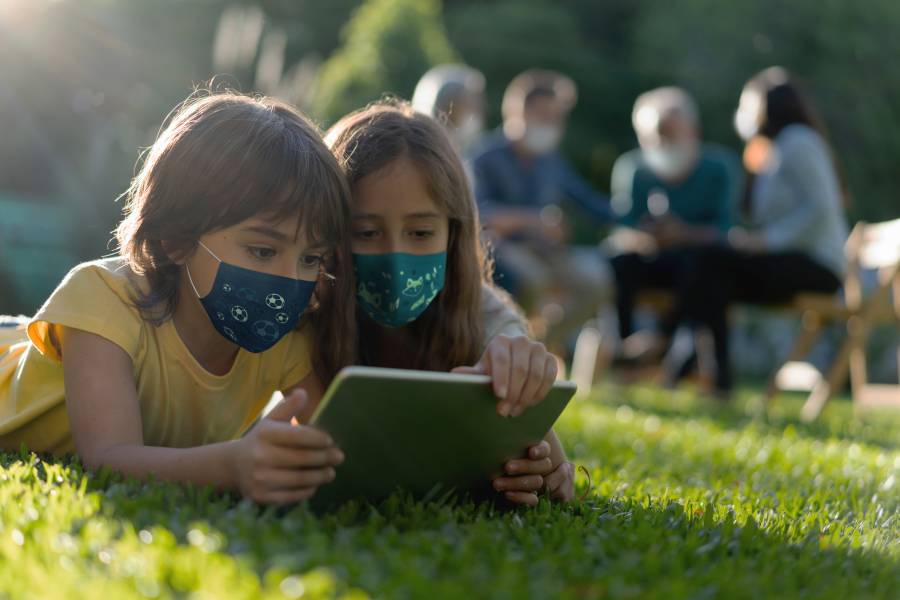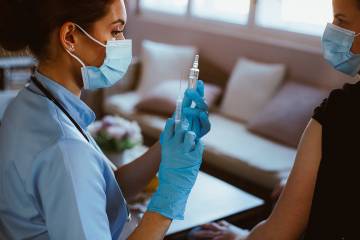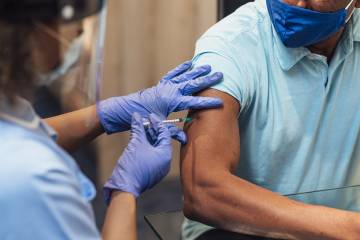Although COVID-19 vaccines offer relief from some of the risks and worries of the past 18 months, parents with young children find themselves in a delicate gray zone.
"One of the hardest parts about being a parent right now is feeling like even though you're vaccinated and ready to celebrate that, you're still living with one foot in the unvaccinated world," says Johns Hopkins epidemiologist and mother of three Keri Althoff. "Even though parents have become very accustomed to this decision-making, it can still be very exhausting. I did not cry tears of joy when I got vaccinated myself, but I will cry those tears of joy and relief when our kids get vaccinated."

Image caption: Keri Althoff
Image credit: Johns Hopkins University
It could be months before U.S. vaccines are granted FDA authorization for those under 12 years old, as trials remain ongoing. (Recently, Anthony Fauci, chief medical adviser to President Biden, predicted that younger children may be eligible by Thanksgiving). For many parents, that means a waiting game.
Althoff, an associate professor at the Bloomberg School of Public Health, recently suggested "north stars" for parental decision-making during these tricky times. The best way to protect your child? Getting vaccinated yourself, Althoff says.
"Vaccinated individuals are not only less likely to become infected with COVID-19, but evidence also suggests they're less likely to transmit the virus if they do become infected," she says. "Beyond that, it's continual monitoring of your child's potential exposures and making decisions based on risks that are reasonable for the children and the household."
In a conversation with the Hub, Althoff offered opinions on the risks associated with typical summer activities for young kids and shared how she and her own half-vaccinated family are navigating through it.
"None of this is easy, and there are rarely black-and-white answers," she says. "But parents have been resilient in this pandemic, and are well-versed in complex decision-making that's right for their families. Parents need to give themselves grace and flexibility, as do their employers and their communities."
How should we be thinking about masks for kids now, as mandates relax in a lot of places?
I think many parents are struggling with talking to their kids about why they still have to wear masks in most places, while their parents might get to take theirs off. Young kids are at a time in their lives when they develop their ideas of what's "fair" or not. For some parents, modeling the behavior is important—so you'll see fully vaccinated parents wearing masks in stores in solidarity with their children.
Every parent is an expert on their child. Helping your unvaccinated kids to understand that they don't have the same level of protection as a vaccinated person, and that parents are making choices to help protect them, may be right for your family.
In what scenarios do you think kids can shed the masks?
I can talk about what my kids are doing. We know that outdoors is a much safer space, reducing transmission opportunities dramatically. So during outdoor playtime, my kids go mask-free. For certain indoor social activities, I'll let them take off masks if the parents and older children from the other household are vaccinated, and only if they're a family that we know has a similar risk tolerance to ours, and therefore has made similar decisions to keep their overall risk of COVID-19 exposure low. I still double-check that no one in the household has been feeling ill prior to get-togethers. If we take our kids to any public indoor space, my kids still wear masks (and I wear one in solidarity).
In your opinion, what activities should parents feel comfortable with right now?
Vaccinated parents can definitely enjoy date night at a restaurant, or socializing with other vaccinated adults. But making sure you're not overlooking your kids' unvaccinated status is important, so a vaccinated babysitter (if you have the option) might be best when parents enjoy these opportunities. Even for day-to-day activities, like grocery shopping, parents may opt to leave their kids safely at home to avoid additional exposure, particularly if masks are not required.
If we could walk through some scenarios, I'd love to hear your opinion on risk levels for kids. First, eating indoors in a restaurant.
An enclosed space without physical distancing and where food is being consumed is a higher-risk situation for any unvaccinated person, including kids. Choose an outdoor venue with lots of space if you wish to enjoy a meal out with your unvaccinated kids.
How about camps?
Parents do a lot of research before signing their kids up for any camp. Asking about the camp's COVID-19 precautions and protocols is an important part of that research. Also, some camps are making requests—for example, they may ask your family to restrict exposures before camp starts, or may require negative COVID-19 test results just prior to arrival. Some are requiring vaccinations for staff. If any of that information isn't readily available, you can ask directly. The goal is to be sure the camp's precautions fit your family's decision-making.
You also need to know what happens if your child developed symptoms at camp. How quickly would you need to drop everything and get them?
Like schools and daycares, most camps have already put a lot of thought into these issues, and camps are also typically subject to state and local COVID-19 mandates. I think many camps will be very successful in creating COVID-19-free bubbles that give kids the experience similar to years past. Kids and their families have dealt with a lot during this pandemic, so finding joy and time to recharge this summer is really, really important.
What do you think about traveling by plane or train?
All modes of public transportation still require mask-wearing, and more people 12 years and older are fully vaccinated every day (although we haven't yet achieved the national goal of 70% fully vaccinated). So with those presumed layers of protection—along with continued attention to social distancing and hand hygiene—the risks of becoming infected while traveling are likely to decrease overall.
Also remember to have a clear understanding of COVID-19 transmission rates and the proportion vaccinated at your summer travel destination. Those two indicators can help you make decisions to reduce your unvaccinated kids' risk while spending time away from home. And in some cases you're not just thinking about the trip itself, but the weeks after. What happens if testing or isolation is necessary upon your return?
What about playing with other unvaccinated children indoors?
It's important to know the vaccination status of others in the household—the parents, any older siblings, or caretakers. The more who are vaccinated, the lower the risk is for the kids to play with other unvaccinated children. And if this is a family you've been in contact with during the pandemic, you'll probably have a sense of their risk levels and precautions they've taken. Reducing the number of households interacting together will also reduce the risk of your unvaccinated children being exposed to COVID-19.
Masks can always provide an additional layer of protection for indoor gatherings with unvaccinated children. Or take the gathering outdoors and take off the masks.
Also see
Do you consider places like pools, waterparks, and amusement parks safe?
Outdoors is always much safer, but make sure there's still distancing going on in these places. You don't want situations where kids are elbow to elbow in line. I always keep masks for my kids handy in case we find ourselves too close for comfort, even outside. But remember that it's not safe to be masked while swimming.
What concrete advice would you give to parents who are just looking for someone to tell them what to do right now?
It's a confusing time for parents, and it feels like there's a lot of conflicting messaging out there. It's important to remember our kids are still vulnerable until they are eligible for the protection that the vaccines provide. So there's a lot that still goes into family decision-making.
There's rarely one right answer for any situation. There will be times when your kid comes up to you sweating beneath a mask, begging to take it off. If you're thinking of taking your kid to a July Fourth parade because that's the family tradition, maybe you're concerned about crowds in close proximity. And even if you plan ahead for a situation, you may feel differently once you actually arrive.
What are you looking forward to this summer with your kids?
We'll be playing outside for the majority of the summer: pool, parks, playgrounds, bikes. When we vacation, we are lucky to travel by personal vehicle and will do our best to enjoy the road trip. We chose vacation accommodations with rooms on the first few floors so we can use the stairs, or rooms with outdoor entrances.
I try to keep my kids' expectations fairly low for anything that could be an uncertain environment which may result in us leaving before we engage—like finding an outdoor restaurant but not being comfortable with the space between tables. We get excited for things we've planned that we know are low-risk, like bike rides with picnics, or time at the pool. It's the small things that provide joy this summer for my kids, and allow my spouse and me a little relief from the constant decision-making.
Posted in Health, Voices+Opinion
Tagged children's health, coronavirus, covid-19 vaccine











